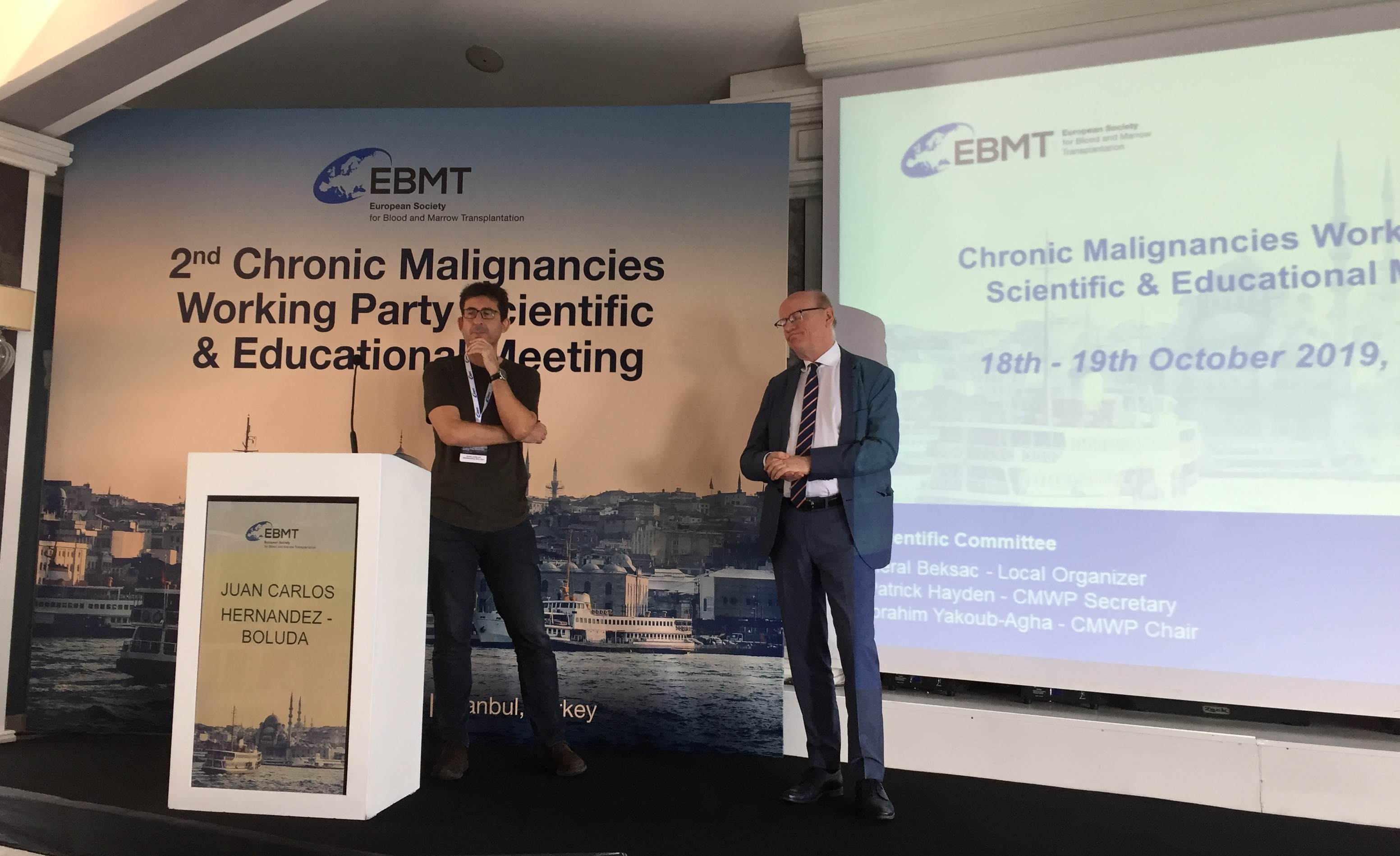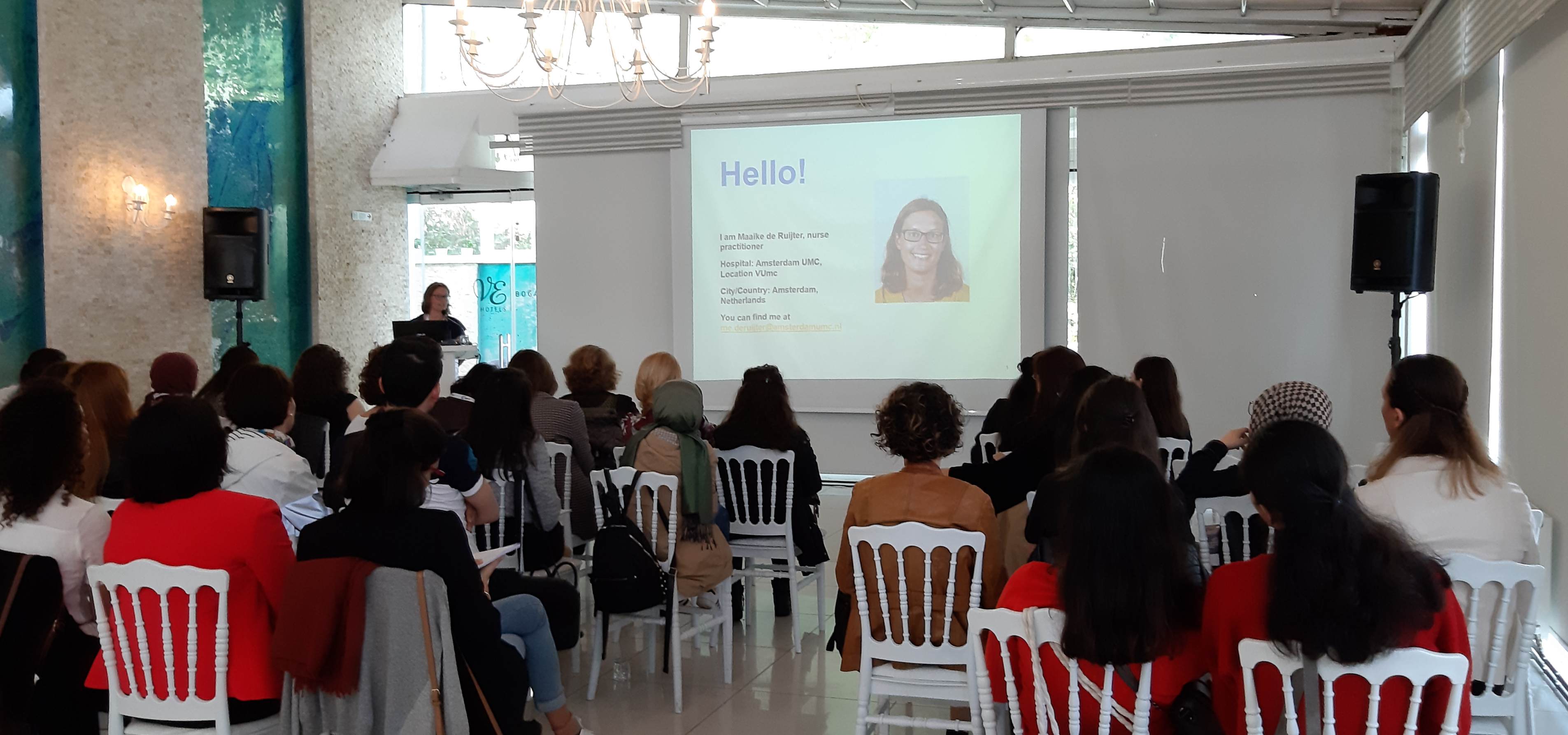
18th-19th October, 2019, in Istanbul, Turkey
Report written by Dr. Polona Novak, Transplant Physician, Department of Hematology, University Medical Centre, Ljubljana, Slovenia.
The CMWP Scientific Meeting took place in morning and afternoon sessions on Friday, 18th October. CMWP chairs from the six subcommittees (MDS, MPN, Plasma Cell Diseases, CML, CLL, and Practice Harmonisation and Guidelines) provided an overview of recently published manuscripts, ongoing studies and new proposals. Working Party members and data managers from the EBMT Leiden office covered topics such as Data Quality Initiatives in different diseases, the updating of MED-B forms and the current status of dozens of active studies.
On the second day, the Educational Meeting attracted 111 attendees from several European countries as well as Brazil, Ethiopia and Georgia.
The meeting started with a Myelofibrosis debate: Is there a role for ruxolitinib treatment prior to transplantation? Professor Nicolaus Kröger (Hamburg, Germany), EBMT President, was in favor and Dr. Juan-Carlos Boluda (Valencia, Spain) spoke against the motion. Professor Kröger presented on a pilot study from his centre in which ruxolitinib was used throughout the peri-transplant period. In this study, early myeloid engraftment was seen and the drug was safely administered in the post-transplant period, being associated with low rates of GVHD. Dr. Boluda, in contrast, highlighted the potential for a higher risk of clonal evolution and more infectious complications due to ruxolitinib. Both agreed that there is a need for a prospective study to assess the impact of this approach on patient outcomes.
In the CLL session, Dr. Olivier Tournilhac (Clermont Ferrand, France) presented on the management of the rare chronic lymphoproliferative disorder, T-cell Prolymphocytic Leukaemia (T-PLL). He discussed the role of alemtuzumab and efforts to improve outcomes following stem cell transplantation as it is currently associated with a high incidence of relapse and graft failure. Dr. Arslan (Ankara, Turkey) then provided an overview of the place of venetoclax in the treatment of chronic lymphocytic leukaemia (CLL) in transplant-eligible patients, particularly in new high risk categories as defined by ERIC and the EBMT.
Following the morning coffee break, Dr. Arat (Istanbul, Turkey) spoke in depth on the biology of TP53 mutations in MDS and the poor prognosis of TP53-mutated disease, even with stem cell transplantation. He also elaborated on ongoing studies on TP53 inhibitors and observed that there is a need for more widespread use of Next Generation Sequencing (NGS) to better evaluate the molecular characteristics of MDS in individual patients. Dr. Gulbas (Istanbul, Turkey) went through the results of studies on the use of azacitidine in the treatment of MDS following allogeneic stem cell transplantation and explained that it appears to be of limited efficacy in this setting. He also provided details of prospective studies, including the RELAZA-2 trial among others, which are currrently assessing the prophylactic use of azacitidine and DLI based on chimerism or MRD.
The Lunchtime Symposium focused on two hot topics, Haploidentical SCT and allogeneic SCT in Myeloma. Professor Kröger (Hamburg) provided an update on recent developments in haploidentical SCT and showed that interest in this approach has clearly increased over the last few years, especially for patients who lack HLA-matched donors. Its exact role, however, remains unclear and there is a need for prospective, randomized studies. The second talk was by Professor Gahrton (Stockholm) who went through the evidence for the use of allogeneic transplantation in myeloma. At present, auto-allo and reduced intensity conditioning approaches appear to offer the best chance of long term survival in high risk myeloma patients.
The first afternoon session focused on multiple myeloma and the evolving role of ASCT in the treatment algorithm. Dr. Rosiñol (Barcelona) reviewed current Spanish trials incorporating ASCT in the frontline setting. Dr. Beksac (Ankara) then considered the evidence for deferred ASCT and the session concluded with a presentation on the treatment of transplant-ineligible patients by Dr. F. Gay (Torino). She recently led on the FORTE study and provided a helpful detailed analysis of its findings.
The afternoon programme also included a session on cellular therapies. Dr. Manier (Lille) spoke about exciting developments in bi- and tri-specific monoclonal antibodies and Professor Yakoub-Agha (Lille), CMWP Chair, then gave a comprehensive overview of the development of Chimeric Antigen Receptor (CAR) T-cells in the treatment of myeloma, an indication for which FDA and EMA approval is likely to be granted over the coming year. Finally, Dr. Hayden (Dublin) described the process behind the development of the forthcoming EBMT Best Practice Recommendations on the Management of Adults and Children undergoing CAR T-cell therapy, detailing how they were usefully informed by a recent CMWP international survey on the management of patients receiving CAR T-cell therapy. He also discussed the ways in which 'real world' usage of these novel agents differs from the eligibility criteria adopted in the relevant clinical trials.
The closing session on GVHD consisted of an informative lecture by Dr. Civriz (Ankara) on the Turkish experience with the use of ibrutinib, the B-cell receptor inhibitor, in the treatment of chronic GVHD.
Finally, Dr. Beksac (Ankara), country host and Plasma Cell Diseases subcommittee Vice-Chair, thanked all the partcipants and brought to a close a stimulating day of transplant-focused debate.
Alongside the physicians sessions there were nurses sessions, covering diverse topics including CML and challenges of ensuring adherence to oral anticancer therapies; support to patients; nursing approach in severe myeloma cases, and nursing care for new drugs such as Daratumomab, Carfilzomib and Venetoclax.
I am grateful to have had the opportunity to attend this meeting as these more focused events lend themselves to interactive disussion and provide a helpful perspective on future trends.

